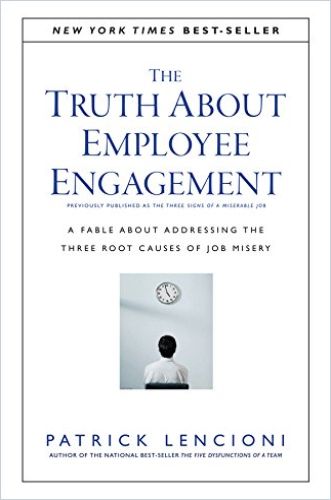Best-selling author Patrick Lencioni addresses the root causes of employee disengagement and how to combat them.

Less Misery, More Reward
In his sixth fable, business guru and best-selling author Patrick Lencioni tackles a highly relatable topic: the causes of job misery. Through the story of Brian Bailey, a fictional CEO turned pizzeria manager, he elucidates three elements that make work miserable – anonymity, irrelevance and immeasurability – and how to fix them.
Personal and Economic Damage
Lencioni argues that most people lead awful lives because they toil in miserable jobs. By his calculus, the tragedy of unhappiness and disengagement at work plays out across all industries and jobs, regardless of pay or prestige. Even weekends offer little reprieve because most people so dread the prospect of returning to work on Monday that their anxiety levels begin to rise on Sundays. A miserable job, Lencioni says, drains your life force.
Scores of people suffer – really suffer – every day as they trudge off from their families and friends to jobs that only make them more cynical, unhappy and frustrated than they were when they left.Patrick Lencioni
Lencioni shares alarming estimates of how much disengagement and job misery cost the economy. More depressingly, he describes the toll job misery exacts on workers’ psyches, and the damage it does to their relationships with spouses, children and the community.
Even the most emotionally mature, self-aware people cannot help but let work misery leak into the rest of their lives.Patrick Lencioni
He points out that an unhappy worker can’t fully enjoy the beauty of life, nor engage in all that it has to offer. At its worst, miserable work can lead to substance abuse, divorce and broken lives.
A Three-Part Solution
Lencioni makes the irrefutable argument that worker disengagement drives costly turnover and erodes productivity. Engaged employees, on the other hand, drive lower costs, improve customer satisfaction and create powerful cultures that confer a sustainable competitive advantage.
A direct supervisor needs to take a genuine, personal interest in an employee in order to increase that employee’s engagement and satisfaction.Patrick Lencioni
The solution to work misery, he says, lies in something virtually every manager knows but the vast majority fail to do. It requires little to no training, but demands constant reminders until it becomes a habit. To get it right, managers must deliver three things for every employee they lead: care, purpose and proof.
Show You Care
First, Lencioni says, get to know your team members personally. Know what they like in terms of work, what they enjoy outside work, and even the names and a few details about the people closest to them. This, advises Lencioni, may sound easy, but it demands regular one-to-one meetings, genuine curiosity and deep listening. You shouldn’t ask non-work-related questions in interviews, but you should with your team members. Find a comfort level that works with employees and inquire. The bottom line, according to Lencioni, is not to treat employees like “workers” or commodities, but like fully dimensional human beings.
Provide Purpose
Second, Lencioni insists that all employees crave purpose and meaning in their work. Accordingly, managers should frequently explain to workers how their efforts and outcomes contribute to a bigger purpose beyond making money – even if the only person employees’ work helps is their boss. Don’t believe it? Lencioni makes a good case by pointing out that even famous and highly-paid models, actors and professional athletes are often miserable. When a person believes their work is irrelevant and feels unneeded, he says, all the money and fame in the world can’t fully compensate.
Even the most cynical employees need to know that their work matters to someone, even if it’s just the boss.Patrick Lencioni
Be thoughtful and specific in your appreciation – a “great job” or a pat on the back now and then will not suffice, warns Lencioni.
Measure Progress
Third, workers need to see progress through hard and continuous measurement of their work. Lencioni acknowledges that this may sound counterintuitive. After all, who would invite more scrutiny and control over their work? Indeed, he admits, some employees will run away. Let them go, he urges, because you’ll be left with those who know they do good work and welcome any metrics that prove it. With your employees, identify clear gauges of progress, and where quantitative measures don’t apply, use others, such as how often an employee helps a co-worker or engages with a customer.
Good Management in Action
To pull it all together, Lencioni tells the fictitious story of Brian Bailey, a 50-something CEO who knows instinctively what makes people tick. After dropping out of college, he pursues a career in management. Decades later his skills earn him the top job at a struggling fitness equipment manufacturer. By applying the principles above, Bailey turns the firm around and then retires.
If a manager has any responsibility in the world, it is to help people understand why their work matters.Patrick Lencioni
Bored and injured from a ski accident, Bailey takes an interest in a local, poorly-managed pizzeria. He invests a little money and signs on as a manager; mostly to test whether his prior success was a fluke. Once again, as Lencioni tells it, Bailey spends time with his team, gets to know them, listens to their ideas and builds trust. From the start, he looks for what people do well and praises them for it. He reminds them of how they serve hungry customers and may even lift people’s spirits through their service. Finally, he works with each of them to devise daily metrics. He offers an extra dollar per hour for those who meet their targets.
Conditions at the pizzeria steadily improve. Bailey keeps the bonus in place because the improved financials more than pay for it. But Bailey’s life changes again; he receives a call inviting him back to “the majors” as CEO of a failing sports retailer.
As long as you think you’ve hired a bunch of misfits who don’t want to be here and will only do what they’re required to do, then that’s what you’ll get.Patrick Lencioni
Here again, as Lencioni describes it, Bailey sees a familiar pattern: talented employees adrift and demoralized due to the neglect and indifference of those they report to. He applies the principles again with similar results.
Applicable and Actionable
As with all of Lencioni’s books, this one is brimming with actionable advice that can be applied immediately. His sixth fable remains a must-read for CEOs, HR professionals and managers interested in boosting employee engagement and understanding the significant toll disengaged employees have on organizations, society and the economy. In the new era of remote work, the topic is more timely than ever.
Lencioni is one of the founders of The Table Group and spearheaded the organizational health movement. He is the author of 13 books, including The Five Dysfunctions of a Team.













